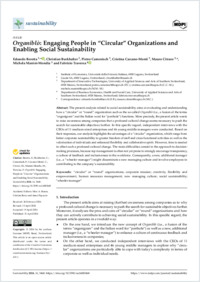Organiblò : engaging people in “circular” organizations and enabling social sustainability
- Beretta, Edoardo ORCID Istituto di economia politica (IdEP), Facoltà di scienze economiche, Università della Svizzera italiana, Svizzera
- Burkhalter, Christian Casale SA, Lugano, Switzerland
- Camenisch, Pietro Department of Innovative Technologies, University of Applied Sciences and Arts of Southern Switzerland, Manno, Switzerland
- Carcano-Monti, Cristina Department of Innovative Technologies, University of Applied Sciences and Arts of Southern Switzerland, Manno, Switzerland
- Citraro, Mauro Department of Innovative Technologies, University of Applied Sciences and Arts of Southern Switzerland, Manno, Switzerland
- Manini-Mondia, Michela Department of Innovative Technologies, University of Applied Sciences and Arts of Southern Switzerland, Manno, Switzerland
- Traversa, Fabrizio Department of Business Economics, Health and Social Care, University of Applied Sciences and Arts of Southern Switzerland, Manno, Switzerland
- 2024
Published in:
- Sustainability. - 2024, vol. 16, no. 8, p. 3468
“Circular” or “round” organizations
Corporate mission
Creativity
Flexibility and empowerment
Human resources management
New managing culture
Social sustainability
"Wheeler manager”
English
The present analysis related to social sustainability aims at evaluating and understanding how a “circular” or “round” organization such as the so-called Organiblò (i.e., a fusion of the terms “organigram” and the Italian word for “porthole”) functions. More precisely, the present article wants to raise awareness among companies that a profound cultural change seems necessary to push the search for sustainable objectives further. In this specific regard, independent interviews with the CEOs of 11 medium-sized enterprises and 46 young middle managers were conducted. Based on their responses, our analysis highlights the advantages of a “circular” organization, which range from better corporate sustainability to greater freedom of staff and cross-functional activities as well as the valorization of individuals and enhanced flexibility and collaborative spirit. However, time is needed to effect such a profound cultural change. The main difficulties consist in the approach to decision-making processes, because top management is often not yet prone to strongly encourage transparency, a culture of feedback and inclusiveness in the workforce. Consequently, a new, additional manager (i.e., a “wheeler manager”) might disseminate a new managing culture and involve employees in contributing to the company’s sustainability.
- Collections
- Language
-
- English
- Classification
- Economics
- License
- Open access status
- gold
- Identifiers
-
- DOI 10.3390/su16083468
- ARK ark:/12658/srd1331805
- Persistent URL
- https://n2t.net/ark:/12658/srd1331805
Statistics
Document views: 71
File downloads:
- Beretta_2024_MDPI_sustainability: 63
